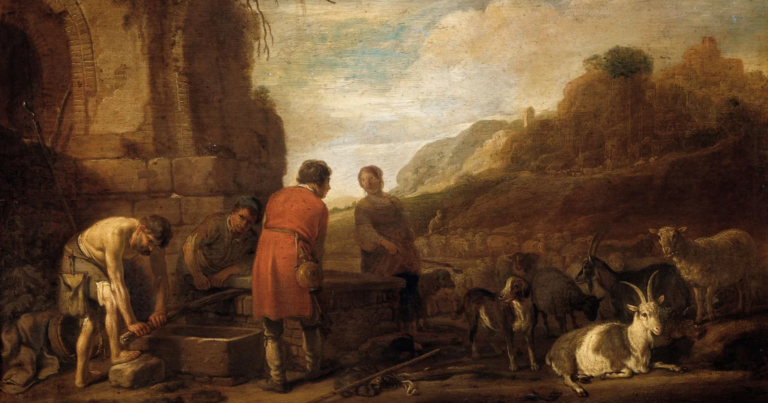“In the beginning, God created the heavens and the earth.”
Genesis 1:1
Genesis, the first book of the Old Testament, is a foundational text that tells a story of the world’s beginning. It’s a treasure chest of lessons on how to grow spiritually and gain wisdom.
This book tells us about the start of everything, the first people, and the early steps of Israel.
But if we look closely, Genesis also shows us how to live better today.
It talks about making choices, facing challenges, and the importance of faith.
As we step into Genesis, we’re stepping into a journey of learning and growth. Let’s discover together the deep values Genesis offers for our spiritual journey today.
The meaning behind Genesis
Genesis stands at the doorway of the Bible, welcoming us into a world of beginnings.
As the opening act of both the Old Testament and the Torah—the sacred Law highlighted by Jesus—Genesis lays the foundation for the spiritual and physical universe.
This book is a compass that points to God’s will, encapsulating the stories of creation, humanity’s early steps, and the ancestors of the Hebrew nation.
The name “Genesis” itself, derived from the Greek word for “origin,” signals its contents:
The dawn of creation, the birth of mankind, and the genesis of the Hebrew people.
In Hebrew, the title בְּרֵאשִׁית (“in the beginning”) mirrors the book’s opening words, setting the stage for the narratives that follow.
Context of Genesis
Genesis and the rest of the Torah are traditionally believed to be written by Moses.
This idea comes from several places.
First, the Torah itself and statements from Jesus and writers in the New Testament all say Moses was the one who wrote these books.
Moreover, Dr. Gary Rendsburg’s research supports this by looking at the language used in Genesis and the Torah.
In fact, he found special pronouns used for both men and women, which is an old way of writing in Hebrew. This shows that these texts were written early on, not later as some people think.
There’s also proof that Moses used older stories and traditions when he wrote Genesis.
The word for “book” shows up early in Genesis, meaning there was a practice of writing down stories at that time.
Moses is known for the parts of the Bible from Exodus to Deuteronomy because he was there for those events. For Genesis, he likely used older stories passed down over time.
This way, he could write a complete story that starts with the creation of the world and leads into the history of Israel.
Let’s take a look at some of the passages from the Bible that highlight the traditional belief that Moses was the author of the Torah, including Genesis:
“Moses then wrote down all the words of the Lord,
and rising early the next day, he erected at the foot of the mountain
an altar and twelve pillars for the twelve tribes of Israel.” – Book of Exodus 24:4“Then the Lord said to Moses, ‘Write down these words, for in accordance with these words I have made a covenant with you and with Israel.'” – Exodus 34:27-28
“‘If you believed Moses, you would believe me, for he wrote of me. But if you do not believe his writings, how will you believe my words?'” – Gospel of John 5:46-47
What is the setting in Genesis?
Genesis opens with a powerful depiction of God as the supreme creator, shaping the universe and forming mankind.
In the beginning chapters, God is referred to as Elohim, showcasing His might and sovereignty.
As the narrative progresses, He is called Yahweh Elohim, emphasizing a more personal relationship with His creation.
The early chapters paint a picture of a perfect world, with Adam and Eve living in harmony in the Garden of Eden.
However, this harmony is disrupted by their disobedience, leading to their expulsion from paradise. Despite this, Genesis 3:15 introduces a glimmer of hope, promising a future victory over evil.
The story of Cain and Abel further explores the theme of sin and its consequences, yet God’s mercy is evident even in punishment. As humanity grows, so does its propensity for sin, culminating in God’s sorrow over His creation.
Yet, in Noah, we find a story of redemption and divine favor, saving humanity from the flood.
Despite the Tower of Babel’s construction showcasing human pride, God’s plan continues, leading to Abram’s call.
The structure of the narrative
The structure of Genesis can be divided into two main parts:
- The primeval history (Chapters 1-11)
- The patriarchal narratives (Chapters 12-50)
The primeval history
Among them, primeval history begins with the creation of the world and mankind, detailing the perfect harmony of God’s initial design.
It then transitions into the fall of man, showcasing the introduction of sin and its consequences through the story of Adam and Eve.
Specifically, Chapter 3 is pivotal in understanding the themes of temptation, sin, and divine judgment. The chapter unfolds with the serpent persuading Eve to eat from the Tree of Knowledge, promising godlike knowledge.
This temptation leads to the first act of disobedience against God. Notably, the serpent refers to God as Elohim, omitting the more personal name Yahweh Elohim, which marks a significant shift in the narrative’s tone.
Eve, succumbing to the serpent’s deception, shares the fruit with Adam, setting the stage for humanity’s fall from grace.
God’s response is methodical, starting with questioning Adam and Eve to uncover the truth behind their actions.
Interestingly, God does not question the serpent, directly moving to dispense justice.
The sequence of events and punishments in Chapter 3 is telling:
The serpent, the instigator, is cursed first, followed by Eve, and finally Adam.
This order mirrors their roles in the narrative.
What stands out is that God curses only the serpent, a unique occurrence in the Bible, indicating the serpent’s role as the embodiment of evil.
The patriarchal narratives
From chapter 12, the focus shifts to the forefathers of the Israelite nation — Abraham, Isaac, Jacob, and Joseph.
Starting with God’s call to Abraham, this part outlines the formation of the covenant, the trials and tribulations of the patriarchs, and the providential guidance of God throughout their journeys.
The narratives highlight faith, obedience, and the unfolding of God’s plan for His chosen people.
Key values from Genesis
“I will put enmity between you and the woman, and between your offspring and hers;
He will crush your head, while you strike at his heel.”Genesis 3:15
1) God’s sovereignty despite human failure
Genesis vividly illustrates God’s unyielding sovereignty amidst human imperfection.
From the moment of creation, through every act of disobedience, Genesis underscores God’s control over the universe and His deep involvement in human affairs.
Despite Adam and Eve’s fall, Cain’s violence, and humanity’s repeated failings, God’s sovereignty remains steadfast.
He initiates covenants, promises a savior, and ensures the continuity of His plan for salvation.
What does this theme teach modern believers?
Well, it shows the nature of divine grace — God’s love and mercy are constant, even when we falter.
That’s why we should trust in God’s overarching plan.
2) Creation and fall
In the beginning, Genesis paints a beautiful picture of God’s creation.
Yet, it quickly transitions to the fall of humanity when Adam and Eve disobey God.
Perhaps not surprisingly, the story of Adam and Eve’s fall in the Garden of Eden reveals our human propensity towards sin.
It shows that we can live in a perfect environment but still choose to disobey. This, in turn, results in separation from God.
But even in this story, we see God’s grace as He promises redemption.
This theme highlights the stark contrast between the divine perfection of creation and the tragic introduction of sin and its consequences into the world.
3) Faith
Faith is a central theme that emerges from Genesis.
The characters’ lives and experiences present us with various dimensions of faith – its challenges, its rewards, and its transformative power.
From Abraham’s unwavering trust to Noah’s obedience, Genesis offers us rich lessons about the nature and necessity of faith.
Abraham, often referred to as the father of faith, exemplifies what it means to trust in God.
Even though he has advanced age and a childless state, Abraham believes in God’s promise of numerous descendants.
His life teaches us about waiting on God’s timing, leaning on His promises, and the blessings that come from unwavering faith.
4) Covenant promises
The concept of covenant is central to the narrative of Genesis, representing God’s unwavering commitment to humanity.
Beginning with Noah, God establishes a covenant marked by the rainbow, promising never to destroy the earth with a flood again.
This promise signifies God’s mercy and sets a precedent for His relationship with mankind.
The covenant with Abraham is even more profound, as God promises to make him the father of many nations, granting him countless descendants and the land of Canaan.
This covenant not only outlines the chosen status of Abraham’s lineage but also foreshadows the establishment of Israel and the coming of a Messiah through his seed.
Again, for contemporary believers, these covenant promises are a testament to God’s faithfulness and His long-term plans for His people.
Who are the writers of the New Testament?
The New Testament, a cornerstone of the Christian faith, was penned by various authors, each contributing unique perspectives and insights into Jesus Christ’s life, teachings, and the early Christian community.
Among these writers, several stand out for their profound connections to the Old Testament and their interpretations of its prophecies:
- St. Matthew: The author of the Gospel of Matthew whose Old Testament prophecies to the life of Jesus. He shows how Christ’s birth and mission fulfill ancient predictions, such as the virgin birth (Isaiah 7:14) and the Messiah’s birth in Bethlehem (Micah 5:1-4).
- St. John: The author of the fourth Gospel and Revelation. He presents a theological depth in his writings, referring to Mary as the “woman” in key moments, echoing the “woman” in Genesis 3:15.
- St. Paul: A pivotal figure in the New Testament, Paul’s epistles address the core tenets of Christian theology, including the nature of sin, salvation, and the role of Christ as the New Adam.
These authors, guided by the Holy Spirit, contributed to the New Testament. They interpreted the Old Testament in the light of Christ’s coming and establishing foundational beliefs for followers of Christ.
The Church Fathers on Genesis 3:15
The early Church Fathers deeply explored the significance of Genesis 3:15, viewing it as the first announcement of the Gospel, or Proto-Evangelium.
Their interpretations enrich our understanding of this pivotal verse:
1) St. Justin Martyr highlighted the contrast between Eve and Mary.
He noted that Eve, in her purity, brought disobedience and death by accepting the serpent’s word.
Conversely, Mary, also pure and virgin, accepted the angel’s message with faith, bringing life and obedience into the world, resulting in the birth of the Son of God.
2) St. Irenaeus of Lyons called Genesis 3:15 the “First Gospel.”
He saw it as God setting enmity between the serpent and the woman, leading to a future where her seed, Jesus, would defeat the serpent. St.
Irenaeus believed that Jesus, born of Mary, was prefigured as the one who would crush the serpent’s head, fulfilling the promise of victory over evil.
3) St. Jerome, known for translating the Bible into Latin (the Vulgate), chose the word “she” in Genesis 3:15 to refer to Mary, emphasizing her role in defeating the serpent.
This translation underscored the belief in Mary as a pivotal figure in salvation history, contrasting Eve’s death-bringing disobedience with Mary’s life-bringing obedience.
To sum up, these interpretations by the Church Fathers not only highlight the depth of Genesis 3:15’s promise but also illustrate the continuity of biblical themes from the Old Testament to the New Testament.
Theological summary of Genesis
Genesis 3:15 stands as a cornerstone of hope and divine promise within the tapestry of biblical narrative.
It encapsulates the enduring message that despite humanity’s fall into disobedience and sin, God’s sovereignty and mercy remain steadfast.
This verse heralds the advent of redemption. It foretells the coming of Jesus Christ as the fulfillment of God’s promise to overcome evil and restore humanity.
Genesis shows us a God who is deeply involved with His creation from the very start. This story of promise, seen in the Old Testament and fulfilled in Jesus Christ’s life, death, and resurrection, reveals God’s great love for us.
As we reflect on Genesis and its teachings, let us be inspired by the depth of God’s love and the certainty of His promises.
Whenever we face doubts or challenges, remember, that the God who made everything and promised salvation through His Son is always with us.













